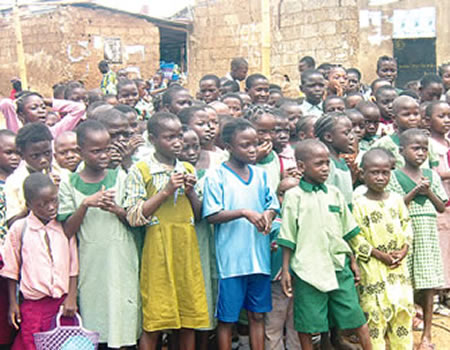I threw a question to the floor after the lesson: “Ok, what do you want to be in future?” The children competed to be recognized and heard; they went on one by one choosing different professions even as some of them contested for already mentioned ones but I doubt if I heard anyone say police. Then, I told them that none made the choice of some critical professions in Nigeria. They were astonished and they looked at one another as if to disprove me. So, I threw the question to the floor: “Who wants to be a politician?”
There was complete silence initially. Most of them did not raise their hands apparently because they did not understand the work of a politician. It was clear that they knew the duties attached to the professions they had chosen. The four children who raised their fingers had different views on why they would be politicians. The first said: “I want to be a politician so that I can be very rich”. The second replied: “I want to be a politician so that I will own plenty houses and cars”. The third said: “I want to be a politician so that I will have power and body guards”. And the fourth, to the surprise of everybody in the class, replied: “Uncle, I don’t want to be a politician because they are thieves.”
Then I asked “Who wants to be the president of Nigeria?” All the children raised up their fingers except the same boy who abhors to be a politician. When asked why, he said “My parents told me that our presidents do not fulfill promises. They tell lies and steal the money of our country. But my parents and my teachers tell us to fulfill promises, to be truthful and sincere and not to steal. So, I will not disobey my parents”.
I want to relate this experience in a children’s class to the reality in our politics. Imagine what a little child perceives of a Nigerian politician! This is in a school of the privileged. It is possible that some of the parents of those children were politicians.
Summarily from the retorts of the children, they hated politics because of corruption. It is as if corruption is an indispensable part of Nigerian politics, as if there is no saint amongst Nigerian politicians. By the way, the children may have been influenced. Yet, innocence perceives better than contaminated and overburdened brain. And if truth was to be, there is nothing less than the reality that politicians are the primary cause of Nigeria’s woes.
From all the responses of the children, the three arms of government which have proven to be responsible for Nigeria’s underdevelopment are detested by the children. Parents must inspire their children to aim high in life but practically display this by the way they chase legitimate livelihood. Children are very quick to learn. They copy everything within their reach. They are true reflections of their parents. If parents and teachers can properly guide and build the children with the intention of building a good future society, Nigeria will be good in a not-distant time. That is our wish for our country.
Muhammad Ajah,
Abuja.






